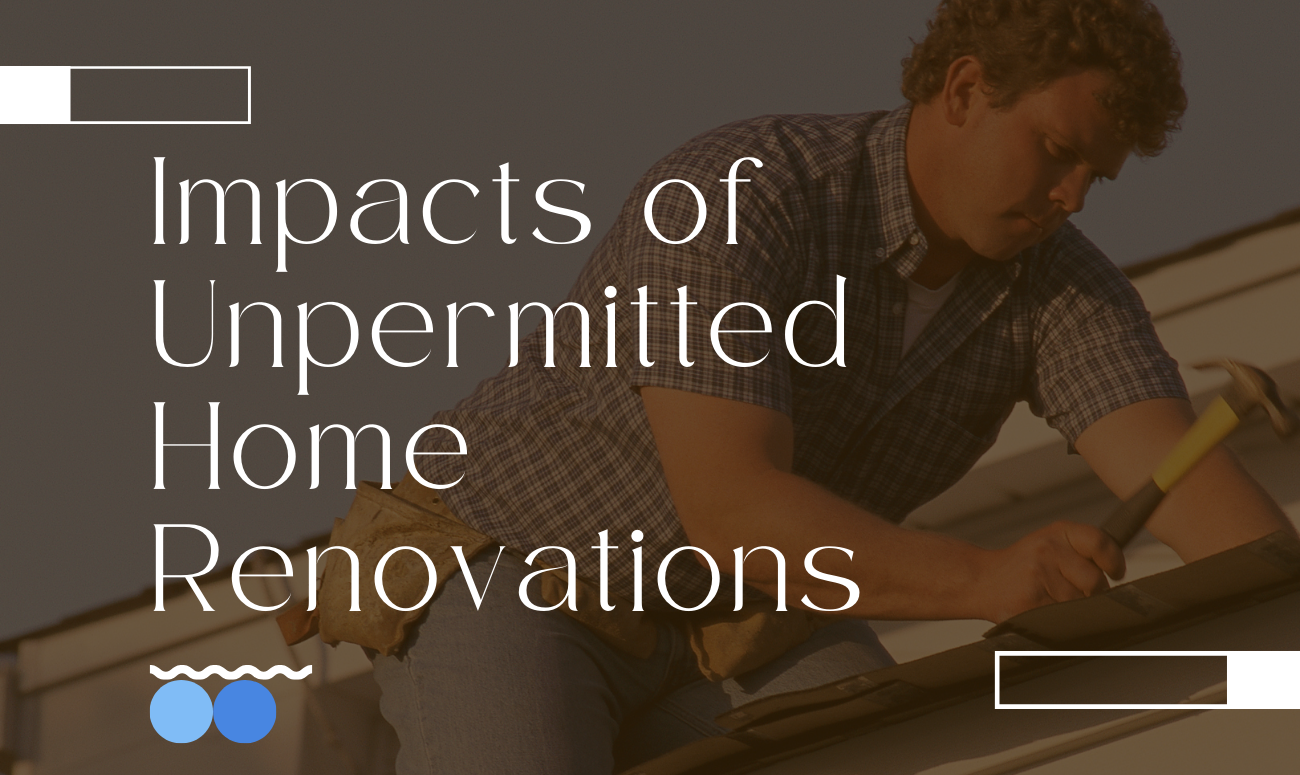Impacts of Unpermitted Home Renovations: The Perplexing Problem of Unpermitted Home Improvements
Introduction
Have you ever wondered if that fancy new deck or finished basement in the house you just bought is entirely legal? If you’re like most homebuyers, you probably haven’t given much thought to whether the seller obtained all the proper permits. However, this seemingly mundane issue can create some significant headaches down the road. Let’s explore the perplexing problem of unpermitted home improvements.
Impacts of Unpermitted Home Renovations: What Counts as an “Unpermitted” Home Improvement?
Basically, any construction or renovation projects that require a permit but didn’t get one can be considered “unpermitted.” Common examples include:
- Adding on a room or building an extension
- Converting an attic, garage, or basement into livable space
- Major electrical or plumbing upgrades
- New decks and patios
- Swimming pools and hot tubs
- New driveways, garages, and outbuildings
However, the specifics vary by jurisdiction. Your local municipal building department sets permitting regulations, so what needs a permit in one town may not in another. When in doubt, check your local requirements.
Impacts of Unpermitted Home Renovations: Why Do Homeowners Skip Permits?
Homeowners decide to forego permits for renovations and additions for various reasons:
- Saving money on permit fees and contractors
- Avoiding heightened property taxes
- Steering clear of strict inspection requirements
- Lacking awareness of rules
- Finding the permitting process cumbersome
Of course, none justify violating building codes and zoning ordinances. However, the financial motivations are compelling, especially for homeowners planning to stay long-term.
Impacts of Unpermitted Home Renovations: Consequences of Unpermitted Work
Although avoiding permits may save money upfront, it can lead to much larger expenses later:
Fines and Retroactive Fees
Once illegal construction comes to light, homeowners typically pay permit fees plus hefty fines. For example, Los Angeles issues $100 daily fines until owners properly permit projects. Other areas charge based on the construction value.
Insurance Problems
Insurers may deny covering damages from unpermitted work. Or, they could cancel policies altogether upon discovering illegal renovations.
Trouble Selling
Many buyers walk away upon learning of unpermitted improvements. Those who do buy likely demand concessions to take on the permitting process themselves. Either way, it costs sellers money.
Impacts of Unpermitted Home Renovations: Legalizing Unpermitted Work
While hardly fun, owners can take steps to legalize unpermitted home projects, including:
- Researching local requirements
- Filing for amnesty programs where available
- Submitting plans and paperwork for retroactive review
- Paying applicable fees and fines
- Scheduling inspections
- Making any required repairs or upgrades
If successful, the once-illegal work becomes officially permitted and code-compliant. However, it’s a lengthy hassle owners should avoid by properly permitting projects from the start.
Impacts of Unpermitted Home Renovations: Risks of Buying a Home With Unpermitted Work
If you find your dream home for a steal of a price, it may have unpermitted renovations. While tempting, buying houses with non-code-compliant additions or construction comes with sizable risks. Before purchasing, educate yourself so you can make an informed decision.
Taking on Responsibility
As the new owner, unpermitted projects become your problem. For example, many states require sellers to disclose illegal work on property disclosure forms. Once you buy the home, you must truthfully answer the same question when you eventually sell.
Additionally, you assume liability for bringing the construction up to code through inspections, permits, and potential repairs. And if discovered, you could face fines or even orders to remove additions entirely.
Exposure to Fines and Penalties
Although uncommon, municipalities occasionally penalize homeowners with unpermitted work. You may have to legalize projects by hiring architects, making costly changes, paying permit fees, and more. Further, if the finished basement or addition increased livable square footage, prepare for higher property taxes too.
In worst-case scenarios, cities require dismantling whole additions found lacking proper permits. It’s an owner’s nightmare that could happen even years after purchase.
Impacts of Unpermitted Home Renovations: Voided Home Insurance Policies
Another real risk is having home insurance deny claims for damage to illegal construction areas. Providers can also cancel policies altogether if unpermitted work comes to light.
The threat multiplies if you finance the home purchase. Should disaster strike the addition, what if insurance refuses to cover repairs or rebuilding? The bank that holds your mortgage expects the asset they partly own to stay protected.
Potential Loan Defaults
Speaking of mortgages, lenders rarely demand full repayment upon discovering unpermitted structures. But in unusual cases, they might call the loan if buyers knowingly take on non-code-compliant construction. It likely violates the original lending terms.
Impacts of Unpermitted Home Renovations: Trouble From Neighbors
Even if municipalities or lenders never catch wind of the unpermitted work, your neighbors could report it. Entering a feud with the people next door means they can easily notify building inspectors to cause headaches. Good relationships with neighbors become even more critical.
In summary, buying properties with illegal renovations threatens fines, insurance problems, loan defaults, and forced revisions or removals. The risks generally outweigh any upfront cost savings from non-code compliant work done sneakily.
Impacts of Unpermitted Home Renovations: Discovering Unpermitted Renovations
When buying or selling, determining if projects lacked required permits starts by carefully examining the property. Compare current construction against original blueprints, if available.
Otherwise, contact previous owners or check municipal records for original plans. This reveals additions or changes made over time needing potential permits.
You can also directly inquire with the local building department on specific permit history using the property’s unique parcel number. Their “field cards” should log all issued construction permits.
Impacts of Unpermitted Home Renovations: Seller Options for Unpermitted Improvements
As a seller facing unpermitted work done under your ownership or predating you, first decide whether to legalize projects or sell “as-is.” Selling as-is often requires discounting for buyers taking on risks and legalization costs.
If keeping pricing intact is preferable, begin the retroactive permitting process through proper channels. This includes hiring architects to redraw plans up to code, submitting for review, paying fees, and scheduling inspections until final approval.
While expensive and tedious, permitted construction allows full-value sale to buyers with confidence everything meets regulations.
Impacts of Unpermitted Home Renovations: Buyer Options for Properties With Unpermitted Work
For buyers finding their dream home has illegal additions, similar choices exist. You can walk away and keep searching, negotiate a lower price to shoulder permitting responsibilities yourself, or request sellers legalize it first.
If you inherit unpermitted projects through purchase, reach out to local building authorities on requirements in your area to retroactively get up to code. The process often includes:
- Filing proper paperwork
- Paying permit fees plus fines
- Making any necessary repairs
- Scheduling code-compliance inspections
- Final approval
Though not always simple, legalizing unpermitted work adds safety, quality, insurability and marketability.
Consequences of Skirting Rules
Despite some owners skipping permits to save money, it often backfires through:
Costly Legalization and Fines
Rather than saving on permit fees initially, owners pay more later plus stiff fines or penalties. For example, Los Angeles fines $100 daily until properly permitted!
Voided Insurance Policies
Insurers can refuse covering damages from illegal construction, or cancel altogether after finding unpermitted additions. This leaves owners unprotected financially.
Trouble Selling or Financing Lenders shy from non-code properties, if insurable at all. And buyers hesitate to take on risks of unapproved projects found after inspection contingencies expire.
Value Diminishment
Attempting to sell without disclosing illegal work risks lawsuits. And if disclosed, it often requires price reductions given high legalization costs faced by buyers.
In summary, proper planning and permitting the first time prevents problems down the road when transferring ownership. Although more initial effort, it rewards those investing in their properties long-term through legitimacy, quality, safety and value preservation.
Impacts of Unpermitted Home Renovations: Conclusion
Unpermitted home renovations and construction pose substantial risks when buying or selling a property. Whether you inherit illegal work through a purchase or create it yourself, consequences include a deteriorating house, increased costs, and uncertain legal status. However, with proper research and retroactive actions, you can legalize unapproved projects and restore your investment’s value.
The first step is to accurately assess any questionable additions or modifications before deciding how to proceed with them. If complex or expensive to rectify, it may not be worth taking on. But for more straightforward issues, educating yourself on what’s needed to bring construction up to current codes can help ensure a safe and valued asset. Many municipalities willingly work with homeowners to legalize unpermitted work, although associated fees and penalties still apply. Permit requirements vary by jurisdiction, so speak with local building departments and hire knowledgeable third-party evaluators when needed.
While not ideal, the permitting process protects homeowners and communities. With smart due diligence and proactive measures, you can safely navigate buying, owning or selling properties where unapproved construction occurred. Seeking expert guidance early can prevent future problems with inspections, insurance, financing, and transferring ownership. So uphold your real estate investment through proper planning and necessary permitting.
Selling Your Tampa Bay Area Home? We’re Passionate Local Experts.
Whether you live in Tampa, St. Petersburg, Clearwater or anywhere in between, we service real estate sales throughout the region. Our deep knowledge of communities from Trinity to Treasure Island allows us to effectively market properties and connect buyers to their perfect home. Trust our years of combined expertise to get top dollar and a smooth sales process.
We proudly help homeowners in:
- Tampa
- St. Petersburg
- Clearwater
- Largo
- Dunedin
- Palm Harbor
- Pinellas Park
- Tarpon Springs
- Westchase
- Wesley Chapel
- Trinity
- And more!
Contact us today to find out how our targeted marketing and expansive reach can benefit selling your house. We’re truly passionate about Tampa Bay real estate. Click to visit our website: https://avalongrouptampabay.com/




